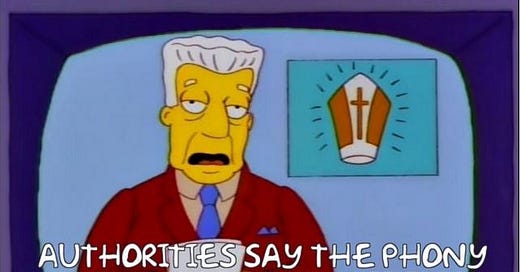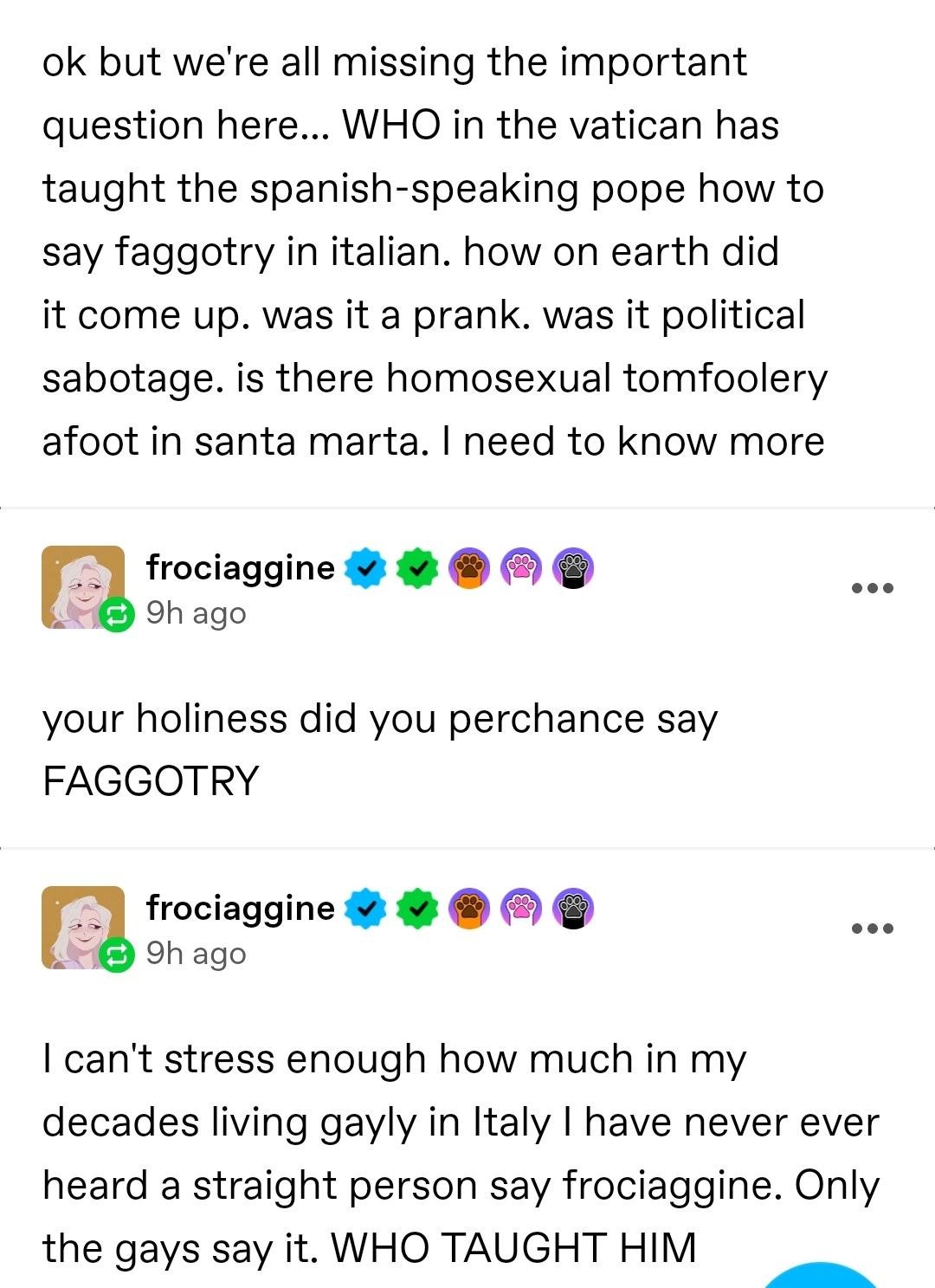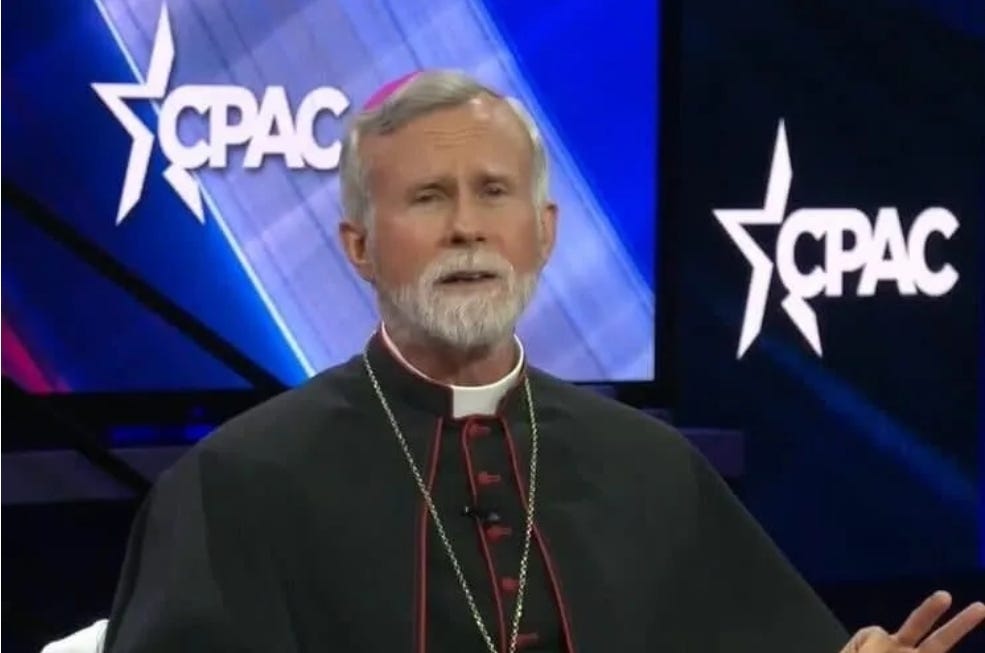By now, you're well aware that on May 28, the Pope had to apologize for an earlier remark where he said that seminaries were getting a little too faggy; golly, that's a sentence. As reported by Reuters:
“Italian media had reported on Monday that Francis used the Italian term "frociaggine", roughly translating as "faggotness" or "faggotry", as he told Italian bishops he remained opposed to admitting gay people into the priesthood. Italian political gossip website Dagospia was the first to report on the alleged incident, said to have happened on May 20 when the pontiff met Italian bishops behind closed doors.”
“The reported comment came at an assembly of bishops held behind closed doors on May 20. The group was discussing the issue of admitting homosexual men into seminaries when Francis used an Italian term that represents a vulgar way to refer to a gay person, the sources said. Francis reiterated that gay men should not be allowed to train in seminaries as priests, according to Italian media, which said that his use of the slur left some in the audience surprised given the pope’s track record of a more welcoming approach toward the LGBTQ+ community.”
Your initial reaction, like mine, was likely a flood of relief that Pope Francis didn't meet with Black Lives Matter activists in 2020 to try out some English colloquialisms he had heard in our popular music. After that, perhaps you fretted that the Pope's work advancing the cause of the first Gamer Saint led to him using Heated Gaming Moment words in conversation. After that, you probably started to get worried about the Pope's upcoming meeting with Chris Rock, and whether the Holy Father was planning to quote any of Mr. Rock’s most famous routines back to him. After that, you likely moved to curiosity as to who is teaching the Pope slurs, specifically a slur so gay and Italian, really only used in Italian gay circles, that there's a gay Italian Tumblr user who uses it as her handle and had this to say:
The Pope's apology statement - which didn't directly state that he had actually said the word but apologized to anyone offended by the use of homophobic language, so it indirectly confirmed the gist of the reports - claimed that the Pope never meant to be so crass, but Italian isn't his first language and he really didn't understand the connotations of what he was saying. Since then, the communications professionals at the Vatican - who clearly knows how bad this all sounds - has tried to put out more information to impress upon everyone that this was not as bad as it sounded, except none of that information has really been helpful.
See, the Pope doesn't speak Italian very well, except he's spent the last eleven years living in a place where everyone's primary language is Italian. The Pope was repeating the term because someone else in the meeting had used it, except that conjures up an image of the Pope going “faggotry, yes, thank you, that was exactly the word I was looking for”. The Pope's remarks were taken out of context, but it's hard for me to imagine a context where I could use that word in a work meeting and not get immediately fired. The Pope maintains his welcoming stance towards queer Catholics, except he was in a meeting where he was explaining that he absolutely did not want gay men entering the seminary. The Pope wrote to a gay man expressing his regret that the man couldn't enter the seminary, except the Pope is literally the guy keeping him out of seminary. But whatever, whatever, let's just assume we can take all of that at face value and the Pope made some sort of Curb Your Enthusiasm-level faux pas in a work meeting, I guess I can go along with that. It was a stupid story, but it was kind of a funny story, and I could laugh at it and move on with my day. And then the Pope did it again.
Yeah, a second time1! A second slur hit the towers! Reportedly on June 11, well after the media furor from when he said it the first time! It doesn't appear to be the only thing he talked about during the meeting, but you'd still hope that, after getting into so much trouble, he'd make some bare minimum effort not to say the slur again. It's the ultra-rare series of events commonly referred to as the “Gina Rodriguez loop,” where you get in trouble for saying something terrible, acknowledge how much trouble you got into, and then just say it again for no decipherable reason. Think about the gay aspiring priest that Pope Francis wrote to, telling him to “thank you for writing to me, you are loved by God, go get em tiger” before almost immediately going to another meeting and saying “yeah guys, turns out we’ve still got a problem with the faggotry”. It's difficult for me to read this series of events as anything other than cruelty. But I suppose if I'm trying really hard to be charitable…it might be dementia?
Right after the PA Grand Jury and McCarrick scandals blew up, like days after, my wife went to Mass and relayed the homily back to me (I was…not in a Mass-going mood). The priest tried to say all of the right things, he said that he hoped this challenge would lead to meaningful reform in the church's structure (it didn't), and he said that we had to hold on to the idea that the church was more than its priests and bishops, that we were all the Body of Christ together and had to continue the work of the church in our own ways. Obviously, failing to act on abuse is far worse than using a homophobic slur (the current Pope has done both), but whenever and however our leaders disappoint us, I feel like we're pointed to this “Body of Christ” idea again and again. We can't let a failure of leadership affect how we all live and work together in the church. Like, here's America saying it right now:
“…for every moment I spend reflecting on the hurtful things the pope said Memorial Day weekend, I should probably spend at least twice as much time reflecting on the Mass I went to that same weekend. Where “Hail Holy Queen” was played by the priest and sung by a bunch of people in their own perfectly imperfect way. People who were just trying to go to church and sing without a cantor and raise their kids and follow Jesus and live life a little better than they would have without being Catholic. That is where the church lives and moves and has its being. And the gates of hell, let alone any ill-chosen words of a religious leader, will not prevail against it.”
The priest's heart, and the heart of the author of that article, were in the right place, and this message is technically true, but in a very important sense, it’s also absolute bullshit. We are all the Body of Christ in the world, and the church is more than just its constantly-mistepping-and-slur-saying leadership, but the church is also, obviously, several other, very tangible things. The church is a collection of buildings, the buildings are worth money, the control of that money is represented in deeds and titles, and those deeds and titles are held by specific people and organizations. The church is a collection of schools with accreditations and employees and criteria for who to educate and who to turn away, and specific people make those decisions. The church is a collection of shelters and food pantries and social service agencies, soup cans on shelves, beds out of the cold, and again, those resources are accumulated and handed out and witheld by specific people. The church is bank accounts and pension funds and university endowments and spreadsheets, and specific people decide what that money gets used for, what buildings to build and which to close, what campaigns to donate to, who to pay how much. All of it is controlled by specific people2 with a very specific set of completely unrelated qualifications3; it's a small club, and we aren't in it. And everyone in that small club answers to an 87-year-old man, and nobody can figure out how to get that man to stop saying “faggotry”. So what do we do with a church like that?
A question I had been struggling to answer in recent months was “what do I actually want from the leadership of the Catholic church?”
It's easy for me to point at people and events and say that they suck, and I think I have some vague understanding of how I would personally like to live as a Catholic, but thinking about how I would like to live as part of a church is harder. What do I actually want from priests, from bishops, from the Pope? How do I want to relate to them, as a layperson? I obviously would like the people in power to say fewer slurs, and I generally want them to be less powerful, but I don't want to kick them out of the church or anything. The thing about how the church is real all of us all in the Body of Christ together is incomplete, but it's still true. I do think it's important to imagine a future where the laity and clergy both have a role. And like, I know the Pope won't ever come out and say “I'm ripping up all the bad stuff that Tony doesn't like and writing new doctrine”, and I know there aren't any cool bishops out there going “I'm ripping up all the bad stuff that Tony doesn't like even if it upsets the hierarchy of the church”. I know that whoever gets put in positions of leadership in the church, they're going to mess up and fail and frustrate us. But right now, they're really bad at this, and they're not getting better, and it’s certainly not much better at the top. There are no meaningful changes coming as to who can be ordained in the Catholic church, and no meaningful changes coming as to how the church will decide who to admit into the clerical class; Pope Francis has made that very clear, when he wasn’t busy quoting his favorite Cum Town bits. So what is a way that this church can all work? What sort of church can we imagine, what sort of structure, that has a shot at being better than this? What do I actually want from the leadership of the Catholic church?
I want the buildings.
That's what I want. I want the buildings. And I want the bank accounts. And I want the schools. I want the shelters and the soup kitchens. If you want to tell me you're a successor of the Apostles and you have opinions on birth control that you want to tell me, fine, whatever. But I want the buildings. You don't get those anymore.
Obviously, I don't mean that I want to personally own the full real estate portfolio of the Catholic church, although that is funny to imagine. What I mean is that the significant material resources of the church should not belong, in any way, to the clerical class. The deeds to the church buildings, the budgets for social services, the control over who to hire and who to fire, those belong to the laity. Let the members of those parishes or dioceses vote on who from the membership gets to be in charge, or to vote on how the parish invests and uses its resources, put some goddam collective decision making in place. I want the laity to have a say in how their church is run, not just in some abstract ‘have your voice heard’ sense, but in the ‘you are now a literal part owner of your church building and your pastor doesn’t have the keys, and he has to do what you and your fellow parishoners say if he wants to keep working in that building’ sense; think of this as the ‘parish pastoral council’ model with teeth. Now, in order for this to work, people do have to show up to meetings and argue with other parishoners and do other mildly uncomfortable stuff, but that’s how these things work, as anyone who’s ever been to a school board meeting or run in a local election can tell you. I could see it all becoming a disaster, sure, but I can’t see it becoming a worse disaster than the church as it’s run now. At least this time, it would actually be run by a somewhat more complete representation of the Body of Christ.
But what about the clergy? What about the hierarchical structure of the church established by Christ Himself? Jesus told the Apostles to make new disciples, He told them to forgive sins, He never said they had to have buildings. So the bishops and priests can all still be bishops and priests, and we can have exactly the same requirements for becoming a bishop or priest as we do now, it’s just that, without buildings, the things that bishops and priests say and do will start to matter a lot less. I even have a great example of a bishop that represents our future, one who is a perfect model for the amount of power clergy will have in this proposed new structure.
Joseph Strickland has no buildings, because they were taken away from him, which is very funny. When he was Bishop of Tyler, he did have buildings, and he wrote school policies, and he decided how the diocese spent its money, and he's still a bishop, but he can't do any of those things anymore. Does he still weigh in on his understanding of Catholicism? Yes, of course he does. He's still on social media, he gave a speech at CPAC earlier this year, he broadcasts what he thinks all of the time, but ever since his buildings got taken away from him, nobody cares. There used to be a news story every time he posted something! Do you remember that? But now, he can't hire and fire anyone. Now, he doesn't decide who gets to work in a Catholic school. Now, if he wants to give to a political campaign or fly to a protest at Dodger Stadium, he can, but he's gotta pay out of pocket like everyone else. Every bishop should be like Joseph Strickland, not in the sense that they should be terminally online cruel idiots, but in the sense that they should all be forcibly stripped of their power to affect any material conditions of the Catholic church. They should all have their buildings taken away. If you say slurs, if you write terrible things, if you believe whatever you read on Twitter, if you’re awful and cruel and ignorant, and you’re writing school policies and donating collection basket money to Republican ballot measures and turning people away from housing assistance, that’s a problem. If you are that horrible but you’re just an old man with a funny hat and no buildings…that’s a much more manageable problem.
I’ve been told, over and over again, when I was a grade school student and a Chicago sex abuse scandal broke, when I was a high school student and a global sex abuse scandal broke, and when I was an adult and more global scandals broke, and then when priests and bishops continued to willingly do the wrong thing over and over again, that I had to put my trust in something other than the men who ran our church, that it was really on us, all of us, to be responsible for our church. It kind of feels like a cop-out, like men refusing to take responsibility for the awful things they had done or ignored. During the 2018 scandals, Robert Barron went with “in a way, the people who did this aren’t at fault, and now is the time to all stay and fight for our church together!” and Pope Francis went with “in a way, this is all our fault so we all have to work together to fix it”, and things like that infuriate me, for obvious reasons. If you’re going to put some of your responsibility on us, then put some of your power on us too. If we have to put our hope in ourselves and not you, then put us, and not you, in charge of the stuff that shelters and educates and pays. Give us the buildings, give us the money, give us all of the material resources. You can still wear your hats and robes and you can post all you want, and I’ll even give you a few passes for some Italian-American slurs (a FEW passes). But we’re the Body of Christ, we’ve been told by you that we’re the real hope for the church, we want the buildings, and you shouldn’t have them anymore.
I disagree with America magazine on everything, but I gotta give them the choice of thumbnail for that story.
Men
Usually degrees in Philosophy and/or Divinity, and I can assure you that universities do not teach “Microsoft Excel” or “criminal statutes of limitations” in those courses.





